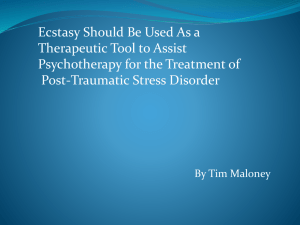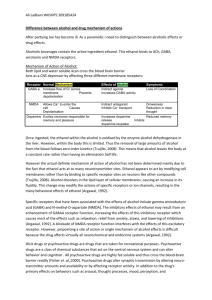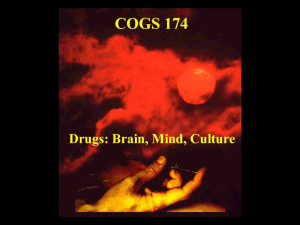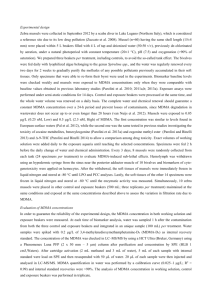Temporary placement of MDMA into Schedule I
advertisement
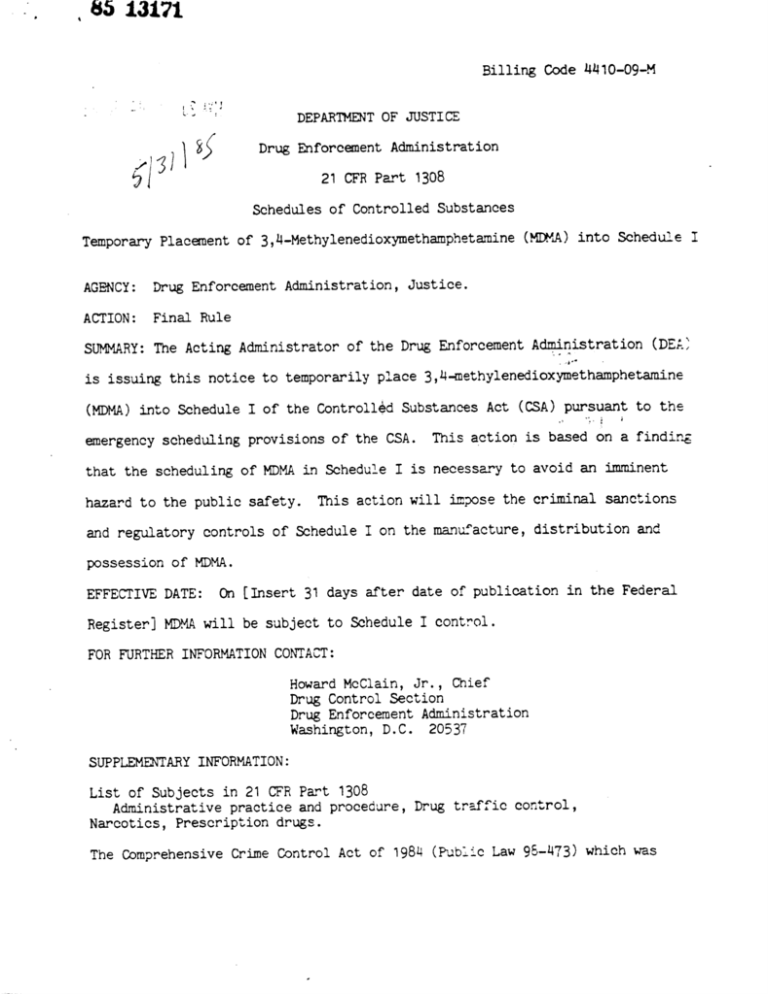
/55 13171
Billing Code 4410-09-M
_'_
_
DEPARTMENT OF JUSTICE
_;
_ll
Drug Enforcement Administrat ion
21 CFR P_-t 1308
_i
Schedules
Temporary.
Placement
of
of Controlled
3,4-Methylenedioxymethamphetamine
AGENCY:
Drug Enforcement
ACTION:
Final Rule
SUMMARY:
The Acting Administrator
is issuing
this notice
Substances
A_ministration,
into
Schedule
Justice.
of the Drug Enforcement
to temporarily
(I,_._)
Administration.. (DEA_
place 3,4-methylenedioxymethamphetamine
(MDMA) into Schedule I of the Controlled Substances Act (CSA) pursuant to the
emergency scheduling
provisions of the CSA.
This action is based on a findir_
that the scheduling of MDMA in Schedule I is necessary to avoid an imminent
hazard to the public safety.
and regulatory
possession
This action will impose the criminal
controls of Schedule I on the manufacture,
sanctions
distribution
and
of MDMA.
EFFECTIVE
DATE:
Register]
MDMA will be subject to Schedule I control.
FOR FURTHER
On [Insert 31 days after date of publication
INFORMATION
in the Federal
CONTACT:
Howard McClain, Jr., Chief
Drug Control Section
Drug Enforcement
Administration
Washington, D.C. 20537
SUPPLEMENTARY
INFORMATION:
List of Subjects in 21 CFR P_t 1308
Administrative
practice and procedure,
Narcotics, Prescription
drugs.
The Comprehensive
Drug
tr__ffic control,
Crime Control Act of 1984 (_ublic Law 98-473) which was
I
Page
2
signed into law on October 12, 1984, amended Section 201 of the CSA
(21 U.S.C. 811) to give the Attorney General the authority to temporarily
place a substance into Schedule I of the CSA if he finds that such action is
necessary to avoid an imminent hazard to the public safety.
be scheduled under the emergency
provisions
A substance
may
of the CSA if that substance
is
not listed in any other schedule under Section 202 of the CSA (21 U.S.C. 812]
or if there is no approval or exemption in effect under 21 U.S.C.
substance.
355 for the
The Attorney General has delegated his authority_ un6er 21 U.S.C.
y_
811 to the Acting Administrator
of the Drug Enforcement
..'
Administration
(28CFR
§0.100(b)).
As required
by Section
Administrator
intention
has
to
provisions.
201(h)(4)
notified
place
the
MDMAinto
of the CSA (21 u.S.c.
Secretary
Schedule
of Health
I pursuant
811(h)(4)),
and Human Services
to the
emergency
Such action may not take effect until the expiration
days after notification
is transmitted
the
Acting
of his
scheduling
of thirty
to the Secretary.
In making a finding of an _,_inent hazard to the public safety, the Attorney
General
is required to consider only those factors set forth in paragraphs
(_i
the history and current pattern of abuse, (5) the scope, d_-ation an_
significance of abuse, and (6) what, if any, risk there is to the public
health, of Section 201(c) of the CSA (21 U.S.C. 811(c)).
House Report
procedure
98-835 which accompanied
[emergency
scheduling]
Public Law 95-473 states
is intended by the Committee
that "Tnis new
to ap_iy to _a-_
has been called 'designer drugs,' new chemical _nalogs or v_-iations of
existing controlled
substances,
or other new substances,
w_ch
have a
Page 3
psychedelic,
abuse."
stimulant
or depressant
effect and have a high potentim]
The report further states that this provision may apply
"substances
for
to
which have been known to chmmists for some time, [which] are
'discovered'
by illicit drug researchers
3,4-Methylenedioxymethamphetamine
wh_ich can produce
be considered
to have psychedelic
effects."
(MDMA) is such a so-called
designer
drug
psychedelic effects and which Congress clearly intended tc
for emergency
scheduling.
On July 27, 1984, in a Federal Register notice (49 FR 30210-{_, the
Administrator
pursuant
of DEA proposed to plac_ MDMA into Schedule I of the CSA
to the traditional
scheduling
provisions
of Section _01(Pa) 6f the
CSA (21 U.S.C. 811(a)). This proposal was based on a review by DEA which
showed that (1) MDMA is chemically
3,4-methylenedioxyamphetamine
and pharmacologically
(MDA), a schedule
I controlled
(2) MI)MA has no legitimate medical use or manufacturer
(3) MDMA is produced in clandestine
related
to
substance,
in the Unite_ States,
laboratories and encountered
in the
illicit drug traffic, and that (4) MDMA has been associated with medical
emergencies
as reported by the Drug Abuse Warning Network
(DA_.;) _nd drug
abuse treatment progra,_, and on a scientific and medical evaluation and
scheduling
reco_endation
for MDMA by the Department
of Health and H_m_n
Services which found that MDMA has a high potential for abuse, that MDMA
presents a significant risk of harm to the public health, an_ that _
should be placed into Schedule I of the CSA.
the findings of the DEA Administrator,
This information
szpp_rted
as published in the July 27, 1985
Federal Register notice, that (1) MDMA has a high potential
for abase,
(2) MDMA has no currently accepted medical use in treatment
in the
United States, and (3) there is a lack of accepted safety
for the use of MZ_'_
'
Page 4
under medical supervision.
As described in Section 202(b)'1]
of the CSA
( 21 U.S.C. 812(b)(1)), these findings for MDMA _-e consis_e_-t with its
Schedule I control
under the CSA.
Several
individuals
interested
have requested
a hearing
in tr_is matter
following the publication of the Federal Register notice.
December 31, 1984, in a Federal Register notice
DEA Administrator
Administrative
The he_%ng
announced
that a hearing would be conven_
Law Judge Francis L. Young' regarding
before
the sc'ne___ing of ,_DFZ.
process is currently underway but the schedule s_gests
that
L
this rulemaking
process will not be completed before the e_d of
DEA has continued
1_5.
to gather information concerning the ab_ase of _
initial proposal to control it was published.
proceeding,
(49 FR 50732-3), the
information
since t_e
Notwithstan_L_g
_he abzve
clearly sh_w_
t_.at placing
has come to light which
MDMA into Schedule I on a temporary basis is necessary to __vzid an i_r_inent
hazard to the public safety.
as well as _nregulated
and uncontrolled
sections of the country.
MDMA is occuring
Unapproved, so-call_
Clandestine
nationwide
therapeutic use of
production of MDMA continues
production,
distrib_ion
and appears to be escalating.
in m_ny
and _buse of
Tr_e _pen prom_tior.
of MDMA as a legal euphoriant through fliers, circulars any _romotional
parties has recently surfaced in some areas. D_
dosage units of MDMA are distributed
treatment
programs
have
reported
agents eszi_te
each mont_. Ln one Tex=_s city.
that in April,
Drug ab _se
that they _-e seeing indi-zi-Z_aZs seeking
treatment who have taken multiple doses of FDFZ.
informed,
that 30,000
1985, the 22nd Expert
Additior.__Z'ly,
DEA nas been
Committe or. Dr_g DepenYer._e cf
Page 5
of the World Health Organization (WHO) recommended that MD_
Schedule
I of the Convention
on Psychotropic
Substances,
be controlled
ir.
1971.
Of immediate concern to DEA in terms of a hazard to the public safety is a
very recent research
properties.
finding which suggests
A paper entitled
Brain Serotonin
that MDMA has neurotoxic
"Hallucinogenic
Nerve Terminals:
Neurochemical
Amphetamine
Selectively
and Anatomical
Destroys
Evidence"
by
G. Ricaurte, G. Bryan, L. Strauss, L. Seiden and C. Schuster, describes
studies which show that single or multiple doses of MDA selectively 'dest,_oy
serotonergic
nerve terminals
in the ra_ brain.
The serotonergic
system
which
is also present in man plays a role in re_alating sleep, mood ,
°_'
: '
se_raal
activity
and sensitivity
the neurotoxic
to aversive stimuli.
Experts have concluded
effects of closely related
that because
structural analogs of MD?_
amphetamine and methamphetamine)
and because both MDA and _
release of endogenous
it is likely that MDMA will produce
neurotoxic
effects
serotonin,
to those of MDA.
Furthermore,
of
(._DA,
cause the
the neurotoxicity
similar
of
_mDhetamine and methamphetamine has been shown in 5 diverse m_mmali_n species.
This strongly
suggests that the substances
would be neurotoxic
to humans.
In accordance with the provisions of Section 201(h) of the CSA
(21 U.S.C. 811(h)) and 28 CFR 0.100, the Acting A_ministrator
has considered
the following factors described in Section 201(c) of the CS_. (21 U.S.C. 811(c
relative
to making
a determination
of whether MDMA poses an i_minent hazard
the public safety:
(4)
(5)
(6)
Its history and current pattern of abuse.
The scope, duration and significance of abuse.
What, if any, risk there is to the public health.
tz
Page
6
Based on a consideration of these factors and in light of the continuing and
apparently increasing number of people being exposed to MI)MA, its potential
neurotoxicity and the lack of accepted medical use or established
safety for
use of MDMA, the Acting Administrator, pursuant to Section 201(h) of the
CSA (21 U.S.C. 811(h)) and 28 CFR 0.100, finds that scheduling MDMA in
Schedule I of the CSA, at least on a temporary basis, is necessary to avoid
s
an imminent hazard to the public safety.
The
Acting
Administrator
temporarily
and
place
H_an
for
consideration
Pursuant
the
by the
to
the
provisions
28 CFR 0.100,
the
from
of
the
date
Food,
Acting
salts
(21 U.S.C.
Federal
the
date
and salts
801 et
Register
seq.)
that
of publication
there
is
of
unless
_fore
201(h)
ne),
its
this
of
order
this
Acting
is
optical,
shall
that
Schedule
gives
to
notice].
in
[insert
the
effect
be taken
into
effective.
U.S.C.
811(h))
on [insert
positional
prior
to
becomes
notice]
A_ministrator
Register
approval
CSA (21
into
of Health
response
notice
Register
rescinded
Federal
the
orders
be placed
in
Act,
to
Secretary
or
the
of
hereby
Federal
the
the
Secretary
Co_.etic
this
of isomers,
intention
an exemption
Drug and
Administrator
publication
CSA to
by the
of Section
Acting
of his
the
t
Administrator
( 3,4-methylenedioxymethamphet_mi
isomers,
I;of
submitted
whether
Federal
notice
Schedule
Comments
including
MDMAunder
transmitted
MDMA into
Services.
notification,
has
any
31 days
MDMA
and
geometric
I of
notice
the
CSA
in
31 days
the
from
/
f_
m__ ...t. LI U.S_.'?'.
qil _'_; _71
_.p'_._,
.
_ .. .
;
'
PageT!
/
i
!
,
]
I
_
_---_
:,/'/
(_
-
'/",_j_/:._
./
-.
_, ,_.
'
_
_/_
-.: .:_'?I
(;C:
For the reasons set forth above, 21 CFR 1308.11(g) is amended _- -_:- ......
--_-g)(2) ts r_a_ as follows:
_--_
§1308.11 Schedule I
J
W
(g)
!
*
m
·
,
(2) 3,4-methylenedioxymethamphetamine
(MDMA), its optical,
positional
and
p
geometric
isomers,
The temporary
is
placement
a completely
MI),V_pursuant
the
hearing
temporary
'
expire
salts and salts of isomers
separate
to
scheduling
proceedings
Schedule
and parallel
!action
21 UoS.C.
in progress
at the
of MDMAinto
811(a).
regarding
....................
I pursuant
(
This
the
from the
action
_11
permanent
of MDMAin Sch_ule
8!1(h)
scheduling
of
in no way interfere
to
of this
21 U.S.C.
proposed
scheduling
I pursuant
end of one year from the date
to
7405
of FDa.
J,.
21 U.S.C.
order
unless
wit_.
This
811(h)
will
the
initiated pursuant to 21 U.S.C. 811(a) are still pending.
In suck
case, the temporary scheduling of MDMA may be extended for up to six months.
All regulations
effective
and criminal
sanctions
applicable
on [insert 31 days after date of publication]
However, individuals
may continue to do so pending submission
with respect
other than Schedule
for Schedule I resem_ch.
possess
of an amended registration
Researchers
to MDMD..
1301 or 1311
a_nd who currently
than [insert 60 days after date of pzblication].
regarding
I substa_nces are
registered with DEA in accordance with P_
of Title 21 of the Code of Federal Regulations
schedules
to Schedule
no later
registered
I are required to obtain a separate
in
registrati:n
In light of the current interest in research
MDMA, DEA will expedite the processir_
MD?_'-
of all new Schedule
I
Page 8
researcher
applications
and amendments
to current
Schedule
I registrations.
As described in 21 CFR 1301.32(a) and (b) and 1301.33, in order to conduct
research with a controlled
research
substance in Schedule I, a person must submit a
protocol for FDA approval, or in the case of clinical
an Investigational
New drug application
work closely with FDA in expeditiously
IND applications
for MDMA submitted
IND applications
must contain
manufacture
(IN]D) for FDA approval.
processing
in compliance
information
with appropriate
concerning
Any person who mmnufaoturers,
and
regulatioms.
the eh_Z_t'rY_ and
of MDMA, its toxic profil_ in animals and detailed
Registration.
DEA will
all research protocols
regarding the clinical studies to be conducted.
1.
research,
protocols
._ _!
distributes,
_
delivers,
imports or exports MDMA, or who engages in research or conducts
instructional
activities
with respect to this substance,
to engage in such activities,
must be registered
or who
proposes
to conduct such activities
in accordance with Parts 1301 and 1311 of Title 21 of the Code of Federal
Regulations.
2.
Security.
MDMA must be manufactured,
with §§1301.71-1301.76
3.
Labeling
and Packaging.
distributed
and stored in accordance
of Title 21 of the Code of Federal Regulations.
All labels and labeling
of MDMA must comply with the requirements
for commercial
of §§1302.03-1302.05,
containers
1302.07
and 1302.08 of Title 21 of the Code of Federal Regulations.
4.
Quotas.
All persons required to obtain quotas for MDMA shall submit
applications
Federal
pursuant to §§1303.12 __nd 1303.22 of Title 21 of the Code cf
Regulations.
Page 9
5.
Inventory.
Every registrant
required to keep records and who possesses
any quantity of F_MA shall take an inventory
pursuant to §§1304.11-1304.19
of Title 21 of the Code of Federal Regulations of all stocks of this
substance
on hand.
6.. Records.
All registrants
required to keep records pursuant
to §§1304.21-
1301.27 of Title 21 of the Code of Federal Regulations shall do so
7.
regarding
MDMA.
Reports.
All registrants
§§1304.37-1304.41
so regarding
8.
require_ to submit reports pursuant
of Title 21 of the Code of Federal Reg_Iatior_;shall
Order Forms.
All registrants
the Code of Federal
Importation
dc
MDMA.
involved in distribution
comply with the order form requirements
9.
to
of MDMA shall
of §1305.01-1305.16
of Title 21 cf
Regulations.
and Exportation.
All importation
and exportation
of MDMA
shall be in compliance with Part 1312 of Title 21 of the Code of Federal
Regulations.
10. Criminal
Liability.
Any activity with respect to MDMA not authorized
or in violation of, the Controlled Substances
Substances
publication
Act or the Controlled
Import and Export Act occurring after [31 days from date of
in the Federal
Register]
is unlawful.
by,
Page 10
Pursuant to 5 U.S.C. 605(b), the Acting Administrator
temporary
placement
of _DMA into Schedule
will have no impact upon sinai] businesses
certifies
I of the Controlled
or other entities
that the
Substances
Act
whose interests
must be considered under the Regulatory Flexibility Act (Pub. L. 96-354).
This action involves
approved medical
the tpmporary
control of a substance with no currently
use or msnufacture
in the United States.
It has been determined that the temporary
the
CSA under
the
the requirements
emergency
scheduling
placement of FDMA in Schedule
pr°visions
is
a statu_,o_
exception
of Executive Order 12291 (46 FR 13193).
Dated: MAY 2 8 _985
D_r_.[n_f_cnim_t[aA°_nist
be atr _e cOP?
Ce_.t _.._'_Of
%:'_
.
',
-'
/_'-'/,_/
rat ion
I of
to


